A Whimsical, Alarming Resonance: Sandra Kasturi
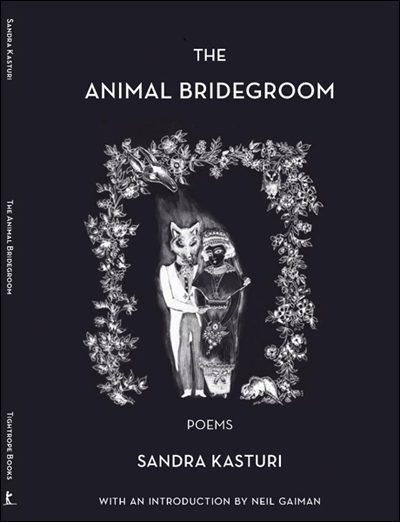
In Sandra Kasturi’s first full length poetry collection, The Animal Bridegroom, one finds all manner of fantastical creatures –shapeshifters, changelings goddesses, and monsters– juxtaposed with the quotidian and the mundane. Myth intersects with reality, resulting in outlandish dream worlds, unexpected bedtime stories, and everyday affairs elevated to the exotic and the surreal.
In his introduction to the collection, Neil Gaiman writes:
“…People forget the joy of story as they grow older. They forget the joy of poetry, of finding the perfect word, of turning a phrase, like a potter turning a pot on a wheel, and they believe mistakenly that poetry is not pleasure, but work , or worse, something good for you but unpleasant tasting, like cod-liver oil.
Sandra Kasturi has not forgotten any of these things.”
Sandra has three poetry chapbooks published, as well as the well-received SF poetry anthology, The Stars As Seen from this Particular Angle of Night, which she edited. Her poetry has appeared in various magazines and anthologies, and her cultural essay, “Divine Secrets of the Yaga Sisterhood” appeared in the anthology Girls Who Bite Back: Witches, Slayers, Mutants and Freaks. Sandra is a founding member of the Algonquin Square Table poetry workshop and runs her own imprint, Kelp Queen Press. She has also received several Toronto Arts Council grants, and a Bram Stoker Award for her editorial work at ChiZine: Treatments of Light and Shade in Words. As an evolution of ChiZine, ChiZine Publications (CZP) “emerged on the Canadian publishing” scene in 2009. To quote from their philosophy:
“CZP doesn’t want what’s hot now or stuff that’s so weird it’s entirely out in la-la-land—we want the next step forward. Horror that isn’t just gross or going for a cheap scare, but fundamentally disturbing, instilling a sense of true dread. Fantasy that doesn’t need elves or spells or wizards to create a world far removed or different than ours. Just a slight skewing of our world, handled properly, is far more effective at creating that otherworldly sense for which we strive.”
Sandra generously gave of her time to talk with us about the slightly skewed otherworld she inhabits; very see below the cut for our recent Q&A.
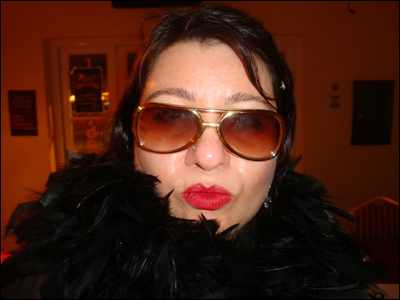
Sandra Kasturi as Elvis, World Horror in Brighton, England, 2010. Photo by Weston Ochse.
COILHOUSE: ChiZine, which you co-edit, is an “independent publisher of weird, surreal, subtle, and disturbing dark literary fiction”, and I understand that it evolved from the “Sick Fuckers Club” (ha, ha!!) an online dark fiction & poetry zine that you and your husband started back in 1997. Now, is Kelp Queen Press, a venture which I believe you helm and is billed as a publisher for “whimsical and alarming” poetry and prose “…in chapbook and perfect-bound book form” an extension of this? How did it come about? And I am also very curious as to how you decided on the name?
Sandra Kasturi: I should probably clarify a bit of nomenclature, just to make things simple. There’s ChiZine Publications (CZP), which is a small indie press, which my hubby, Brett Savory and I run. Then there’s ChiZine.com (also know as The Chiaroscuro), which is the online zine, which is still running. There’s also the Chiaroscuro Reading Series, which our Managing Editor at CZP, Helen Marshall and I started. So it’s all a bit confusing!
Anyway, CZP actually evolved from ChiZine.com, the online zine. ChiZine.com did, however, evolve from the “Sick Fuckers Club” which is the name Brett came up with when he founded the magazine back in 1997. He and I hadn’t even met yet, so I can take no credit for his, ah, genius. It was sort of a zine back then, but it was also kind of a club–you got to have your own page up at the site, with photo and info, and we boasted of “members” in X number of countries. Can’t remember now, but there really were people from all over the world. Brett wanted to get well-known writers and other people in the field to join–and he invited Pete Crowther. Pete said he’d join if Brett came up with a better and slightly more professional name than “Sick Fuckers Club.” And he sent Brett a list of a bunch of cool words/ideas that seemed right. Brett liked Chiaroscuro best, so that became the name of the zine, its subtitle being “treatments of light and shade in words.” Which I think fit pretty well. Because it was Chiaroscuro + magazine, it eventually became “ChiZine.” Which I joined as poetry editor in 1999. And then we decided to do the whole thing in print, but with story collections, novels and novellas, and that was in 2008. And here we are now!
Kelp Queen Press was my solo venture from back in 2001. I wanted to do these limited edition poetry chapbooks and little oddities that really wouldn’t find a home anywhere. It’s been mostly on hiatus now, since I’m spending so much time working on CZP stuff. KQP still produces the occasional “Loonie Dreadful” which are lurid tales in chapbook form. They’re fun–they give writers a chance to, basically, indulge all their worst habits. I’ve actually rejected things for not being over the top enough, or lurid enough. I think I once even said, “I think this is too well-written to be a Loonie Dreadful. Do you have anything worse…or tackier?” I also did weird greeting cards and was thinking of maybe some Christmas ornaments…but then CZP came along and took up all my spare time. I still plan to revamp Kelp Queen in the near future, perhaps even as an imprint of CZP. That way I could still do poetry, which of course CZP doesn’t publish. We’ll see! When I have some free time. Ha!
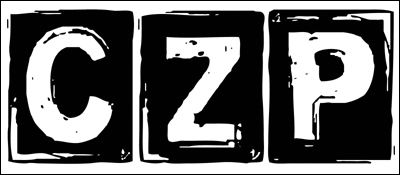
I think KQP came about because I wanted to do a second poetry chapbook of my own work, and Junction Books owner Carleton Wilson, who had done my first chapbook just suggested that I print one myself, since that’s what most poets did. It’s a much more widely accepted practice in the poetry world, where it’s so difficult to get a book of any kind published. Most poets end up doing chapbooks so that they can showcase their work. So I thought, why not? And thus Kelp Queen was born. But I thought I’d do some other poetry chapbooks too and publish some other authors. That first year I ended up publishing Colleen Anderson’s poetry chapbook, Ancient Tales, Grand Deaths & Past Lives, David Niall Wilson’s series of broadsides, Cities of Light and Darkness, as well as Jason Taniguchi’s collection, Very Sensible Stories and Poems for Grown Persons. And of course my own Pursuits & Conjurings; Horrors, Guises. And really, I did almost all the work myself, like layout and design, but I was lucky enough to have artist friends like Kristy-ly Green and Sarah Ennals who gave me cover art in return for copies. With the Dreadfuls later on, I literally stapled them myself in order to save money. Labour of love, but all very exhausting! But there’s KQP/CZP synergy for sure–I originally printed the first 4 “chapters” of Gord Zajac’s Major Karnage ongoing series. Which of course CZP ended up buying and printing the novel version. So there you go.
Oh yeah–Kelp Queen Press, the name. I used to go on these annual camping trips with my girlfriends, and we would cook on the grill and drink cocktails and have a giggle. Anyway, one year we decided to come up with superhero names for ourselves, but we’d all have really lame powers. I think I’d been swimming in the lake, and I had a low-cut bathing suit, and all this seaweed ended up down my cleavage and on my stomach. I said something like, “You ever notice when you come out of the water here, that you end up with a shelf of kelp on your middle?” So “Shelf of Kelp” was my superhero name. I had the power of… well… kelp. Exciting. We all thought this was hysterically funny at the time. And yes, we were in fact adults when this was going on, believe it or not. So when I wanted a name for my press, I thought Shelf of Kelp Press wouldn’t quite work, so it became Kelp Queen Press. And my friend Helen Waters Lee did this awesome logo for me, complete with saucy wink. Man, that’s a long story. And probably tells you more about my drinking habits and kooky friends than you need to know!
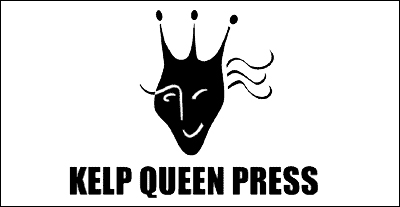
I see the description of “speculative fiction” mentioned frequently with regard to the works that you publish. I’d love to know what draws you to this particular genre, and what in your opinion, differentiates it from plain old sci-fi/horror/fantasy, etc. What are some of the best and worst examples of the genre? What do you look for in the works that you end up publishing?
Well, I think of “speculative fiction” as the umbrella term for all things that qualify as SF, fantasy, horror, magic realism, dark fantasy, space opera, paranormal whathaveyou, and so on. If you say “speculative fiction” you can lump in a whole bunch of things you might not otherwise be able to. If we just said “SF” at CZP, we’d end up with nothing but strictly science fiction novels, and that’s not all we want. Fantasy similarly evokes a very specific concept, as does horror (that misguidedly ghettoized redheaded stepchild of the spec fic universe). We wanted submissions that could fall into any one of those three categories, but we also wanted work that didn’t really fit into any category–which is when “speculative fiction” becomes a really handy term. For example, Simon Logan’s Katja from the Punk Band isn’t really in any of the three standard spec fic categories. I think we’re calling it an “industrial noir.” But there’s a faint spec element in there. We also say that we want “dark literature.” That doesn’t necessarily mean horror. Tom Piccirilli’s Every Shallow Cut, for example, is more of a noirish thriller, if you absolutely had to categorize it. But Derrryl Murphy’s Napier’s Bones is kind of a science fantasy, in a way. But they both fit in with what we do. I always say, the books that are right for us are kind of like porn. We know it when we see it. Heh.
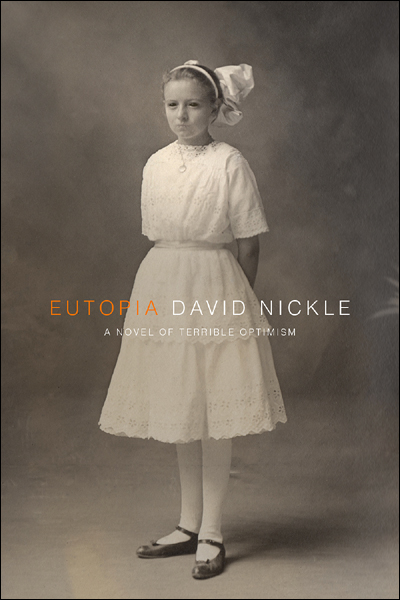
Some of the best examples of the genre(s)? Well, gee, in a completely mercenary move, I’ll say anything we print at ChiZine Publications, of course!! Actually, we’ve got a list of authors on our submission guidelines page whom we really like–most of them are writers we’d be happy to publish. Some don’t quite fit our mandate because they’re not really writing in our genre, but we still like their work (like Malcolm Gladwell). Okay, right–good writers in the genre who are not published by CZP (yet!). Peter Watts’ Blindsight is a terrific book. Justin Cronin’s The Passage. Stephen King’s Bag of Bones. Mary Doria Russell’s The Sparrow. J.K. Rowling in general. Cherie Priest’s Eden Moore series. Joe Hill. Steven Erikson’s Malazan series. I resent him deeply because he made me cry several times. George RR Martin’s Fire & Ice series. He’s another one who knows how to kick the crap out of you emotionally with his writing and his characters. Anne Sexton’s poetry book, Transformations. It’s a collection based on fairy tales and really gets you in the gut. Oh! Angela Carter of course. Karin Lowachee. Cory Doctorow. Robert Charles Wilson. Joe Lansdale. Phyllis Gotlieb. Philip Pullman. Ray Bradbury! And of course the truly amazing Ursula Le Guin.
The worst stuff? Twilight, of course. I won’t even bother ranting about that because I think I’ve pretty much worn myself out now, and people are tired of hearing me go on! Deborah Harkness’s A Discovery of Witches–a book I so wanted to love because of its subject matter, but it was so badly written it was almost unreadable. And I waded through all 580 pages of it! There’s some time I’ll never get back. Anything by Dan Brown. Piers Anthony (though he was better in the early years). John Norman! God, those Gor books… though I kind of secretly love them for camp value and all the crazy misogynistic shit in there that is so over the top that it’s almost funny now.
What we look for in books we publish…hmmm. We like to say “resonance.” I think of it as something that makes you almost literally sit up in your chair. You usually know from page 1 whether it’s going to be any good or not. I give everyone the benefit of the doubt, though. I’ll read the whole sample they send, no matter how awful it is. If that isn’t a triumph of optimism over experience, I don’t know what is! Obviously we look for books that are the right fit for CZP. We’ve occasionally turned down things that we thought were good, simply because it wasn’t the kind of thing we do–and sometimes we’ve made suggestions of other publishers for the author to try, because we thought they were good enough, just not right for us. I think what I most look for in a book is for me to say, when I’ve finished reading: “Damn. I wish I’d written that.”
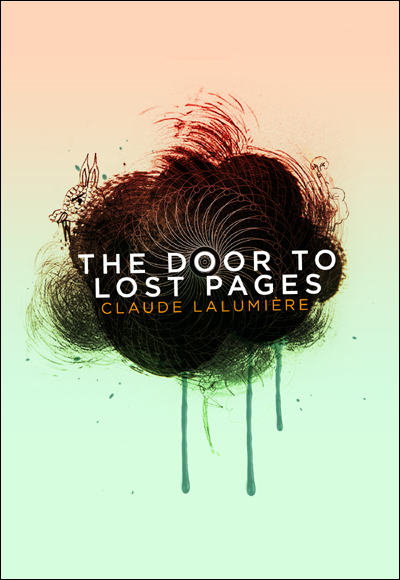
Regarding your own writing, you seem to draw deeply from mythological themes, time-worn tales of terror, and dark symbolism, but it’s punctuated by some sly, surprising humor. One of my favourites, for example is “Frankenstein’s Monster’s Wife’s Therapist” Tell me more about this twisted, playful streak that wriggles through your writing. Where does this come from? What are some of your influences in this regard?
Frankenstein’s Monster’s Wife’s Therapist
She tells me she’s happy now.
They’ve reconciled. He spends
most evenings at home
and they’ve started to try
to make babies; he bringing
their limbs home, she
with her size 10 sewing needle.
Thanks very much! “Frankenstein’s Monster’s Wife’s Therapist” is one of those things I actually whipped off in about 2 minutes, just on a whim, and it earned me a bunch of award nominations and people seem to love it, or it creeps them out, or whatever. But I always get a reaction when I read it! The whole thing just stemmed from people always calling the monster “Frankenstein” when in fact Frankenstein was the scientist, so it should always technically be “Frankenstein’s Monster”…so of course the bride would be “Frankenstein’s Monster’s Wife”…and so on. The apostrophes amused me.
Where does my “playful streak” come from? Having a bunch of dark times in my life, I expect! Most people I know who have gone through a lot of shitty things have developed strong senses of humour and a real sense of the absurd. After all, how else would you cope? I hope I’ve got both of those things! I do know that I am deeply sarcastic, which, frankly, a lot of people find aggravating. I find it difficult to take a great many things seriously. Which is why a lot of poetry and poets make me roll my eyes. It’s all so very earnest! Which is something I have very little patience with.
I think too, that I read a lot of genre books at an early age that were quite funny. The Hobbit, for example, is a much funnier book than most people remember it being. I’m just rereading it again now for about the 30th time, and I’m struck again by some of the humour. Lord of the Rings is of course much darker. And a lot of C.S. Lewis is very charming and often hilarious. It’s so disappointing that the Narnia movies captured absolutely none of his sense of humour. Hmm…I think I read a lot of wonky British books as a child. Agatha Christie of course is filled with funny stuff, which is kind of unexpected of course, since she wrote about–gasp!–Murder. All that stuff had a huge influence on me. Marry that to all the mythology and fairy tales I read as a kid, and I guess my own peculiar sensibility is what you end up getting. I guess I’ve always been fond of the weird. And my dad took me to a lot of age-inappropriate movies when I was a kid: Hitchcock, and that sort of thing. Nothing that seems too bad now, but very atmospheric stuff that a child of 6 with an overactive imagination probably shouldn’t have seen! But I kind of like where it all led me.
I am curious about your other projects – you co-created a children’s animated television show? What’s that all about?
Yes, Jason Taniguchi and I created this show called The Adventures of the Sinister Horde which later got shortened to Sinister Horde. It was about an evil overlord who was also a single dad, and was told from the villains’ point of view. We had this terrific, really detailed world, and absolutely loved our characters. It was in development with Nelvana/Corus for a number of years. Watching your creations come to life in animated set design and character sketches was a wonderful experience. Unfortunately, it got shelved, because there were other properties that Corus had bought that were too similar, and which made it to air first. And just recently, when I saw the trailer for Universal Pictures’ Despicable Me, I thought, “Man, if only our show had made it to air, that film would have looked derivative!” I keep hoping that Nelvana will take it off the shelf at some point. The world we created is huge, with lots of potential stories. But Jason and I have other animated show projects we’re working on and are getting ready to pitch. So we’ll see what happens with those.
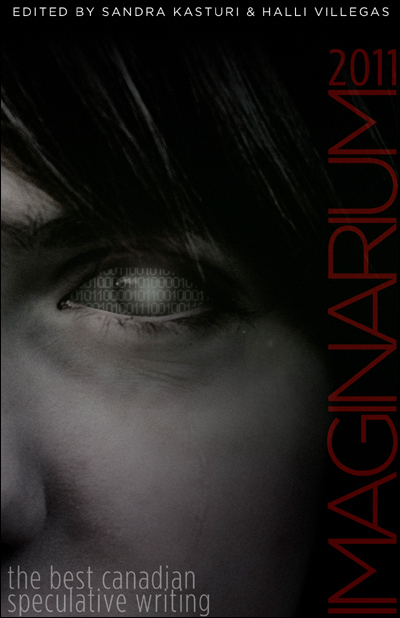
I also read that you’ve got a few novels in the works – a “mythological noir”, a “steampunk epic”, and a “dark YA fantasy”…please tell me there are no romantical teenaged vampires in that last one, ha! Are there any details you can share about these works-in-progress? Is there anything else in the works for either yourself or ChiZine, or Kelp Queen Press?
Yeah, I’m always working on, like, ten things at once. Actually, come to think of it, I’m usually reading ten books at once, so I guess that’s just how I operate? “Mythological noir” is just the term I coined for my book Medusa Gorgon, Lady Detective, because I couldn’t think of any other genre it really fit in, other than the generic “spec fic.” I’m so behind on delivering that manuscript, it’s just shameful. My new goal is to get it done by the end of August. The steampunk epic is just this thing that sprang into my head full-blown. I have an outline, but not much else–it’s something that will require a lot of historical research into the British East India Company and Harry Houdini and Kali cults, and I’m just too tired and don’t have enough time to work on it right now. The dark YA fantasy came about in a funny way–one of our editors/slush readers, Samantha Beiko was doing this project for her publishing program, in which she and her class were supposed to create a publishing house/imprint, complete with authors/novels for a project. So she asked writers she knew to create fake novels for her fake company. It was really fun, actually–I made up this book called The Thirteenth Princess, which riffs on “The Twelve Dancing Princesses” fairy tale. I ended up liking the idea, and decided I would turn the fake book into a real one. That one’s on the backburner now too, though–got to get Medusa Gorgon done first! Plus, my second poetry book, Come Late to the Love of Birds, is coming out in June 2012, so I have to finish that manuscript as well.
As for what’s coming up for ChiZine Publications, Kelp Queen Press and myself…lots of naps? I hope? With CZP, we’ve got a lot of irons in the fire, like working on film deals and translation rights and book club stuff for our authors, trying to get through all the manuscripts in our “maybe” pile for all the writers who have been waiting so patiently! We’re already starting work on the fall titles, though it seems like the spring titles just barely finished… Kelp Queen, as I said, is mostly on hiatus now, bar the occasional Loonie Dreadful. There’s a few I want to reprint, as they sell out quickly. Maybe by 2013, we’ll have rolled KQP into CZP as an imprint…we’ll see how it goes! And for myself? Getting that damn novel done, and my poetry manuscript! And also, having that first gin & tonic when the weather gets warmer. I really look forward to that.

April 14th, 2011 at 8:09 pm
Very entertaining interview she comes across as a ball of fire. Love Sandra’s unabashed critiques almost as much as her work. Frankenstein’s Wife’s Therapist was delightful. “The apostrophes amused me” – Excellent!!!
April 18th, 2011 at 4:33 pm
Fascinating woman, and a fantastic interview. Thanks, dearie!
February 10th, 2012 at 5:48 am
[…] 2012 in Salt Lake City this year) Innismouth Free Press (2011) Blood and Vegetables (2011) Coilhouse (2011) Totally Tesseracts (2010) Books on the Radio […]